

Thoth. Thoth Thoth was the God of Knowledge, the Moon, Measurement, Wisdom, the Alphabet, Records, Thought, Intelligence, Meditation, the Mind, Logic, Reason, Reading, Hieroglyphics, Magic, Secrets, Scribes, and Writing.
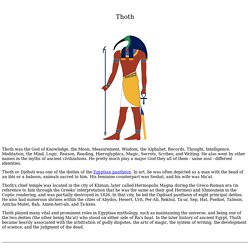
He also went by other names in the myths of ancient civilizations. He pretty much play a major God they all of them - same soul - different identities. Thoth or Djehuti was one of the deities of the Egyptian pantheon. In art, he was often depicted as a man with the head of an ibis or a baboon, animals sacred to him. Thoth's chief temple was located in the city of Khmun, later called Hermopolis Magna during the Greco-Roman era (in reference to him through the Greeks' interpretation that he was the same as their god Hermes) and Shmounein in the Coptic rendering, and was partially destroyed in 1826. The Real Story of Medusa: Protective Powers from a Snake-Haired Gorgon.
Great Beasts of Legend: Centaurs, Sirens and Chimaera: The Greeks and their Monsters. Gorgon. A Gorgon head on the outside of each of the Vix-krater's three handles, from the grave of the CelticLady of Vix, 510 BC In Greek mythology, a Gorgon (plural: Gorgons, Ancient Greek: Γοργών/Γοργώ Gorgon/Gorgo) is a female creature.
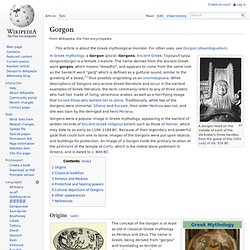
The name derives from the ancient Greek word gorgós, which means "dreadful", and appears to come from the same root as the Sanskrit word "garğ" which is defined as a guttural sound, similar to the growling of a beast,[1] thus possibly originating as an onomatopoeia. While descriptions of Gorgons vary across Greek literature and occur in the earliest examples of Greek literature, the term commonly refers to any of three sisters who had hair made of living, venomous snakes, as well as a horrifying visage that turned those who beheld her to stone. Greek mythology. Argonaut, in Greek legend, any of a band of 50 heroes who went with Jason in the ship Argo to fetch the Golden Fleece. Jason’s uncle Pelias had usurped the throne of Iolcos in Thessaly, which rightfully belonged to Jason’s father, Aeson. Pelias promised to surrender his kingship to Jason if the latter would retrieve the Golden Fleece from Colchis.
ATLAS - Greek Titan God, Bearer of the Heavens. Daemones or Spirit Personifications. Unusual Greek Myths Archives - Classical Wisdom Weekly. Hieros Gamos – Sacred Marriage. “Hieros Gamos, Greek for ”sacred marriage, ”sacred wedding feast”, or ”sacred sexual intercourse”, is the technical term of a mythical or ritual union between a god and a goddess, or more generally a divine and a human being, and most especially a king and a goddess.

The term has its widest use in the study of kingship in the city cultures of the ancient Near East… The hieros gamos as a royal ritual is the creation of early city-states built on the wealth provided by agriculture. Far from putting an end to the “primitive” village cults, they expanded and stylized them with forms that were derived from, and were variations of, earlier symbolism. Greek Mythology-The Creation of the First Greek Gods. Ancient Greek mankind, trying to explain certain metaphysical phenomena and anxieties, invented amazing myths concerning the Cosmogony (the creation of the World) and the Theogony (the birth of the Gods).
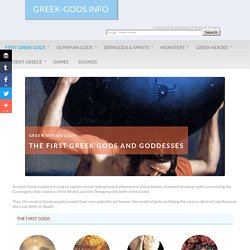
Thus, the ancient Greek people created their own splendid, yet human-like world of gods, justifying the various abstract significances like Love, Birth or Death. The First Gods Chaos. Hesiod's Theogony, Myths and Meaning - Ancient Greeks, Prometheus, Golden Age, Zeus, fire, Plato, mythology. Ancient Greeks were interested in understanding their place in the world around them.

They were very interested in the roots of their existence, and wanted to know how they fit into the world around them. Greek myths contributed to this effort. They looked around their world and asked why? List of Greek Gods and Goddesses. The following list of Greek Gods and Goddesses is a complete list of the major and minor deities of Greek mythology.
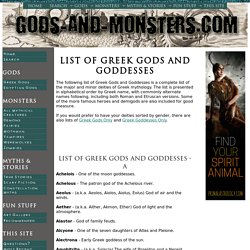
The list is presented in alphabetical order by Greek name, with commonly alternate names following, including both Roman and Etruscan versions. Some of the more famous heroes and demigods are also included for good measure. If you would prefer to have your deities sorted by gender, there are also lists of Greek Gods Only and Greek Goddesses Only. Greek mythology, w/ pictures. The Elements: Fire. The Ancient Greek Esoteric Doctrine of the Elements: Extended Version © 1999, John Opsopaus The Essence of Fire Each of the Elements is characterized by a dominant and a secondary Power or Quality: Earth is Dry and Cool, Water is Cool and Moist, Air is Moist and Warm, Fire is Warm and Dry.
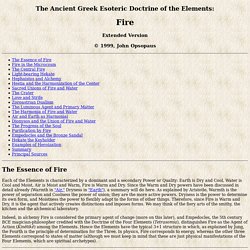
Since the Warm and Dry powers have been discussed in detail already (Warmth in "Air," Dryness in "Earth"), a summary will do here. World of Mythology. Heracles. Having performed all twelve labours Heracles was now free from any more obligations to Eurystheus.
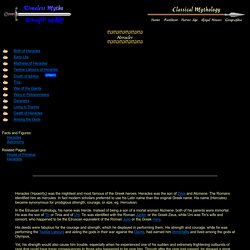
He was left to his own device. Eurytus (Εὐρυτίων), king of Oechalia, was offering his daughter's hand in marriage (Iole, Ἰόλη), if one of the suitors could defeat him or his sons in the archery contest. While Heracles was receiving education, Eurytus had taught archery to the young Heracles, which the king was soon to regret. Heracles won the competition, but Eurytus refused to give his daughter away. Eurytus was afraid that Heracles might kill her daughter as the hero had killed his sons in madness. Heracles left Oechalia in anger, while Eurytus' son, Iphitus (Ἰφιτος) tried to persuade his father that the hero had won Iole's hand fairly.
(According to Homer, Eurytus died young, when he challenged Apollo into an archery contest. He tried to get Neleus, king of Pylus and then later Hippocoön (Hippocoon), king of Sparta, to purify him for the murder of Iphitus, but both kings refused. Greek Mythology, a World of Mystery and Imagination. Pantheon. Aether (mythology) In Greek mythology, Aether or Aither (Æthere, Ancient Greek: Αἰθήρ, pronounced [aitʰɛ̌ːr]), also known as Akmon or Acmon in Latin (possibly from the same route as "Acme") is one of the primordial deities, the first-born elementals.
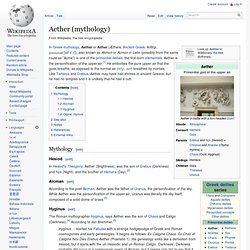
Aether is the personification of the upper air.[1] He embodies the pure upper air that the gods breathe, as opposed to the normal air (ἀήρ, aer) breathed by mortals. Like Tartarus and Erebus, Aether may have had shrines in ancient Greece, but he had no temples and it is unlikely that he had a cult. Hyginus ... started his Fabulae with a strange hodgepodge of Greek and Roman cosmogonies and early genealogies. It begins as follows: Ex Caligine Chaos. Ex Chao et Caligine Nox Dies Erebus Aether (Praefatio 1). DELPHI: The Oracle at Delphi. The Oracle at Delphi The oracle at Delphi is a figure of great historical importance that was, and still is, shrouded in mystery.
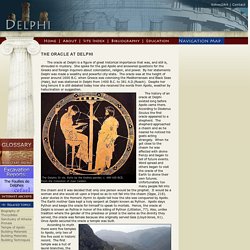
She spoke for the god Apollo and answered questions for the Greeks and foreign inquirers about colonization, religion, and power. By her statements Delphi was made a wealthy and powerful city-state. The oracle was at the height of power around 1600 B.C. when Greece was colonizing the Mediterranean and Black Seas (Hale), but was stationed in Delphi from 1400 B.C. to 381 A.D. (Roach). The Delphic Orcle. These Were the Gods of Atlantis. The majority of researchers who dedicate their time to the mystery of Atlantis come to conclude that...
The majority of researchers who dedicate their time to the mystery of Atlantis come to conclude that the kings and masters of Atlantis were the later gods of antiquity in Egypt, Greece, America and northern Europe. This conclusion is based on the assertion that the primeval tribes were so filled with amazement at the abilities of the Atlantean refugees that they regarded and accepted them as divinity. In Greek mythology, Zeus was the godfather of the third celestial dynasty and the son of Cronus and Rhea. The Romans referred to him as Jupiter. He was the supreme ruler of Mount Olympus but couldn’t influence fate. Olympian Gods of Greek Mythology THEOI.COM. The Olympian gods ("Theoi Olympioi") presided over ever facet of ancient life and were often grouped according to their common functions. History of the Trojan War.
The Trojan War. The Lost Gods: The Greeks. The Mystery of the Ancient Roman Tunnel to Hell. There is a place on the northern shore of the Bay of Naples that has long been steeped in history, mystery, myth, and magic. Known as the Phlegræan Fields, it is a desolate place; a barren wasteland strewn with rubble and intersected by deep underground vents that belch out choking fumes and fire. Legends and strange phenomena cling to this hellish, smoke-wreathed landscape, so it is perhaps no wonder that these fields are a location believed since ancient times to hold a tunnel that leads to Hell itself.
The Phlegræan Fields is a plateau that is part of an ancient volcanic caldera not far from Mt. Greek Mythology. Greek mythology. Greek mythology is explicitly embodied in a large collection of narratives, and implicitly in Greek representational arts, such as vase-paintings and votive gifts. Roman Mythology. There are therefore many similarities between Roman mythology and Greek mythology: only the names change. This practise is called syncretism which means the blending, or fusion, of religious beliefs, myths and practices to form a new religious system.
Roman Mythology Names. Roman mythology. The Lost Gods: The Romans.